In 133 and 123/122 BCE, the Gracchan reforms opened three cans of worms, pitting the Roman landowning elites against their poorer compatriots, Roman economic interests against those of the Italian allies, and senators against equestrians. As these cumulative divisions threatened to coalesce into a perfect storm, the noble and wealthy tribune of the plebs M. Livius Drusus in 91 boldly proposed a comprehensive if costly New Deal. The eventual annulment of Drusus’ visionary reform package set the stage for the armed rebellion of Rome’s key Italic allies. Even before the conclusion of this gargantuan struggle in 87, the deep divisions Drusus and his backers had sought to resolve, compounded by political discontent among the enfranchised Italians, caused the Roman polity to descend into a series of devastating civil wars, terminated in 82/81 by Sulla’s vindictive victory and reactionary new settlement. Offering a novel narrative analysis of the pivotal events of this well-known but often poorly understood period, this book seeks to demonstrate how the time from Livius Drusus’ tribunate of the plebs to Sulla’s unparalleled dictatorship was marked by momentous reform and experimentation and suggests that the former’s fateful failure arguably represents the moment the Romans lost their ancestral Republic.

